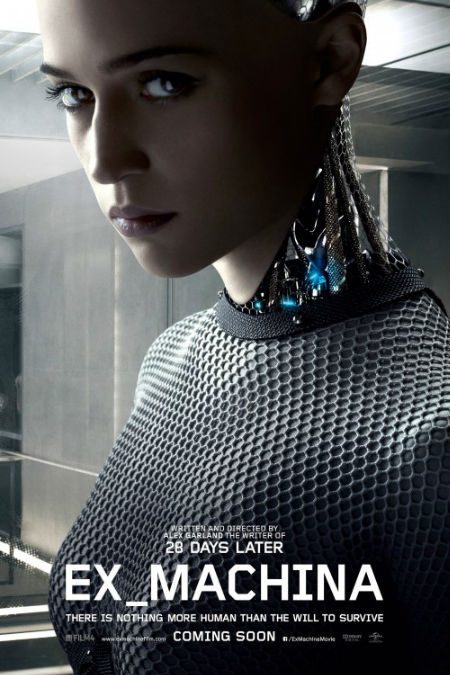
It’s often ben said that humanity is its own worst enemy, given that our collective shortcomings and flaws often coming close to outweighing our propensity for innovation, advancement and renewal.
It’s a thesis explored with gusto, tension and an artistic film noir aesthetic in Alex Garland’s (28 Days Later, Never Let Me Go) rivetingly intense new film Ex Machina.
Lifted you would assume from the latin phrase “Deux ex Machina” or “God From the Machine”, the movie asks how humanity might react when Artificial Intelligence (AI) technology, long regarded as an if not when proposition, springs fully-formed into life, in this case through the hands of socially-maladjusted internet search engine billionaire genius and Greta Garbo-level recluse Nathan Bateman (Oscar Isaac).
His creation, a purring, manifestly self-aware, intrinsically sexual face-of-a-woman, body-of-a-robot being called Ava (Alicia Vikander) seems to possess everything you could ask of any person – superb linguistic skills, artistic sensibilities, a knowledge of human behaviour and a spontaneity that allows her to react in conversation as anyone else would.
But is she really human, reacting of her own free will and sense of self, or simply, as one of the characters asks at one point, a chess computer who can play chess but doesn’t know it is playing chess?
Determining just how human she is, using the “Turing Test” which uses blind conversations conducted with an unseen machine to see if they react in ways that mimic humanity or demonstrate it in full, falls to one of Bateman’s employees, Caleb Smith (Domhnall Gleeson) who arrives at his employer’s remote, mist-shrouded, bunker-like residence full of anticipation and not a little unease.
The unease it turns out is more than a little justified with both Bateman, a man who veers between nightly alcohol-fuelled benders and repentant, intense morning workouts interspersed with sparkling water and brown rice, and a seductive knowing Ava, seeming to play their own strange games with an increasingly suspicious and unnerved Smith.
Uncertain whether he is being manipulated by Ava or Batemen or both, or whether it’s all a product of his increasingly fevered imagination, Smith perseveres with the amended Turing Test, different to that conceived by the great British mathematician by virtue of the fact that Smith is aware from the first that his test subject is most assuredly a machine.
Ah yes but what kind of machine and can she pass for human, something Bateman is understandably desperate to answer?
That is the billion dollar question, one that Smith finds increasingly hard, and yet ridiculously easy to answer, all at once in a film that manages, thanks to Garland’s well-proved ability to inject intelligence and studied insight into tense, thriller-like situations, to keep you on the edge of your seat throughout.
Though it is suffused with all manner of existential dilemmas, moral conundrums and intellectual sparring, Ex Machina is as far from a dry cinematic dissertation on the nature of life as you can get, preferring to anchor its socially-relevant conversations in the flawed humanity of real people, namely Bateman and Smith.
With adroit, carefully-calculated performances from both Isaac, Gleeson and Vikander, and superb cinematography by Rob Hardy which drenches the film in moody, highly-atmospheric lighting whether it’s outside in the surrounding rain-soaked forests or inside Bateman’s lab-like, minimally-set home-cum-research facility, Ex Machina is that rare movie that engages the mind every bit as much as it titillates the senses and sets the nerves on edge.
That it also manages to contribute something fresh and intriguing to the debate over advances in AI, long overshadowed by the dark, towering presence of Skynet and the Terminator franchise, is a bonus.
Ava is presented not so much as a threat to humanity as its almost perfect fulfilment or unnervingly reflective distillation, with the ending, which manages to be simultaneously definitive and ambiguous, suggesting that we may well reap what we sow, but not necessarily in a cataclysmic way, if we allow technology to lull us into thinking we have become gods, as Bateman, misappropriating something Smith says to him in passing about his achievement in creating Ava, seems intent on doing.
Ex Machina dwells more then on humanity’s predisposition to crippling hubris than the theoretically vengeful nature of any of our thinking and feeling creations – though it’s interesting that we seem convinced we will be avenged, as if we innately sense we are more flawed than we often let on to ourselves and can;t help but pass that on to what we create – and cleverly leaves much of the narrative suspended below the surface for the majority of the film, only revealing its true hand at the end of the film in ways that make perfect sense and yet will still surprise.
A masterful confection of intelligent debate, dramatic moments and humanity writ large in ways both great and glorious, and stingingly petty and flawed, Ex Machina is a sumptuous exploration of what it means to be human, and whether that will ultimately work for, or against us, in the years to come.